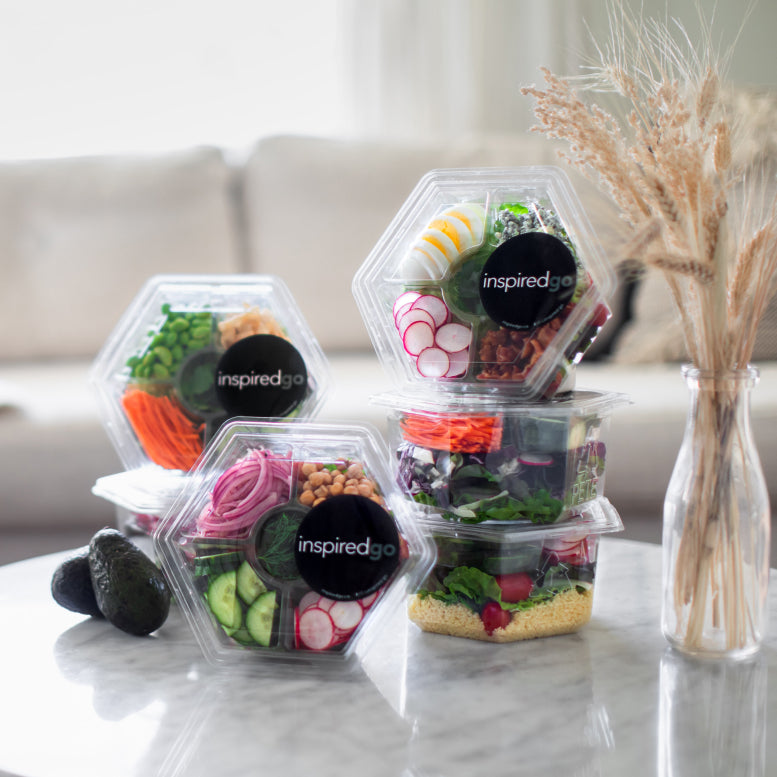What Foods Are Vegetarian?
Table of Contents
1. Embracing Vegetarianism with Inspired Go
2. How Do You Get Enough Protein on a Vegetarian Diet?
3. How Does a Vegetarian Diet Support Heart Health?
4. How Can Vegetarian Meal Delivery Support Long-Term Health Goals?
1. Embracing Vegetarianism with Inspired Go
Order fresh salads today →


2. How Do You Get Enough Protein on a Vegetarian Diet?
Ensuring sufficient protein intake on a vegetarian diet is achievable with a variety of protein-rich plant-based foods such as lentils, chickpeas, tofu, quinoa, tempeh, and dairy products. These ingredients provide essential amino acids needed for muscle maintenance, energy production, and overall health. Vegetarian meal delivery services address protein needs by designing meals rich in these plant-based protein sources, ensuring balanced macronutrient profiles. Pre-portioned servings prevent overconsumption while guaranteeing adequate protein intake. Nutritional transparency, including protein content per serving, helps customers track their daily requirements effectively. By removing the challenges of meal planning and preparation, vegetarian meal delivery services provide a reliable way to meet protein goals without hassle.
Choose your salads and schedule delivery →
3. How Does a Vegetarian Diet Support Heart Health?
A vegetarian diet is known for its cardiovascular benefits, including reduced cholesterol levels, lower blood pressure, and decreased inflammation. Vegetarian meal delivery services prioritize heart-healthy ingredients like leafy greens, whole grains, nuts, seeds, and olive oil in their pre-prepared meals. These ingredients are rich in fiber, antioxidants, and essential fatty acids, which contribute to improved heart health. Subscription services ensure consistent access to balanced meals, eliminating reliance on unhealthy or processed foods. Transparent nutritional labeling provides clarity on sodium, fat, and calorie content, allowing customers to make informed choices. Vegetarian meal delivery supports long-term heart health with structured, nutrient-dense meal plans.
Get fresh salads and snacks delivered →
4. How Can Vegetarian Meal Delivery Support Long-Term Health Goals?
Inspired Go supports long-term health goals by offering nutritionally balanced vegetarian meals crafted with fresh, high-quality ingredients. Each meal is portion-controlled and includes key nutrients such as fiber, plant-based protein, and antioxidants. Subscription services allow customers to schedule consistent weekly deliveries, eliminating disruptions in their dietary routines. Detailed nutritional labeling helps customers monitor their intake and align their meals with specific health goals, whether focused on weight management, energy levels, or overall wellness. By removing the barriers of meal preparation and planning, Inspired Go empowers customers to stay committed to their long-term health objectives through reliable and convenient meal delivery.
Try our fresh, ready-to-eat salads →
Frequently Asked Questions
A vegetarian diet focuses on plant-based foods, eliminating meat, poultry, and fish while including fruits, vegetables, grains, legumes, nuts, and seeds. Depending on the type of vegetarianism, it may also include animal-derived products like dairy and eggs. Popular variations include lacto-ovo vegetarian (includes eggs and dairy) and lacto-vegetarian (excludes eggs but includes dairy). The diet is often chosen for ethical, environmental, or health reasons and supports a nutrient-dense lifestyle when properly balanced.
Vegetarian foods include a wide variety of plant-based options like fruits, vegetables, whole grains, legumes, nuts, and seeds. Dairy products such as milk, cheese, and yogurt, as well as eggs, are included in lacto-ovo vegetarian diets. Vegetarian-friendly dishes range from hearty grain bowls and vegetable curries to pasta, soups, and salads. Many processed foods, such as chips or baked goods, can also be vegetarian, though reading labels is key to avoiding hidden animal-based ingredients.
Yes, many vegetarians eat eggs, depending on their dietary preference. Those following a lacto-ovo vegetarian diet include both eggs and dairy products, while lacto-vegetarians exclude eggs but consume dairy. Eggs are an excellent source of protein, vitamins, and minerals, making them a valuable addition to a vegetarian diet. However, vegans avoid eggs entirely, as their diet excludes all animal-derived products, including dairy and honey.
Vegetarians can meet their protein needs by incorporating a variety of plant-based and animal-free sources. Protein-rich options include legumes (lentils, chickpeas, black beans), tofu, tempeh, nuts, seeds, and whole grains like quinoa. For those who consume dairy and eggs, options like Greek yogurt, cheese, and eggs provide additional high-quality protein. Combining different plant proteins, such as rice and beans, ensures a complete amino acid profile, supporting muscle repair and overall health.
Yes, eggs and cheese are allowed on a lacto-ovo vegetarian diet, which includes both dairy products and eggs alongside plant-based foods. These ingredients are excellent sources of protein, calcium, and other essential nutrients. Lacto-vegetarians exclude eggs but include cheese and other dairy products. Vegans, however, do not consume eggs, cheese, or any other animal-derived products, focusing solely on plant-based foods and alternatives.

